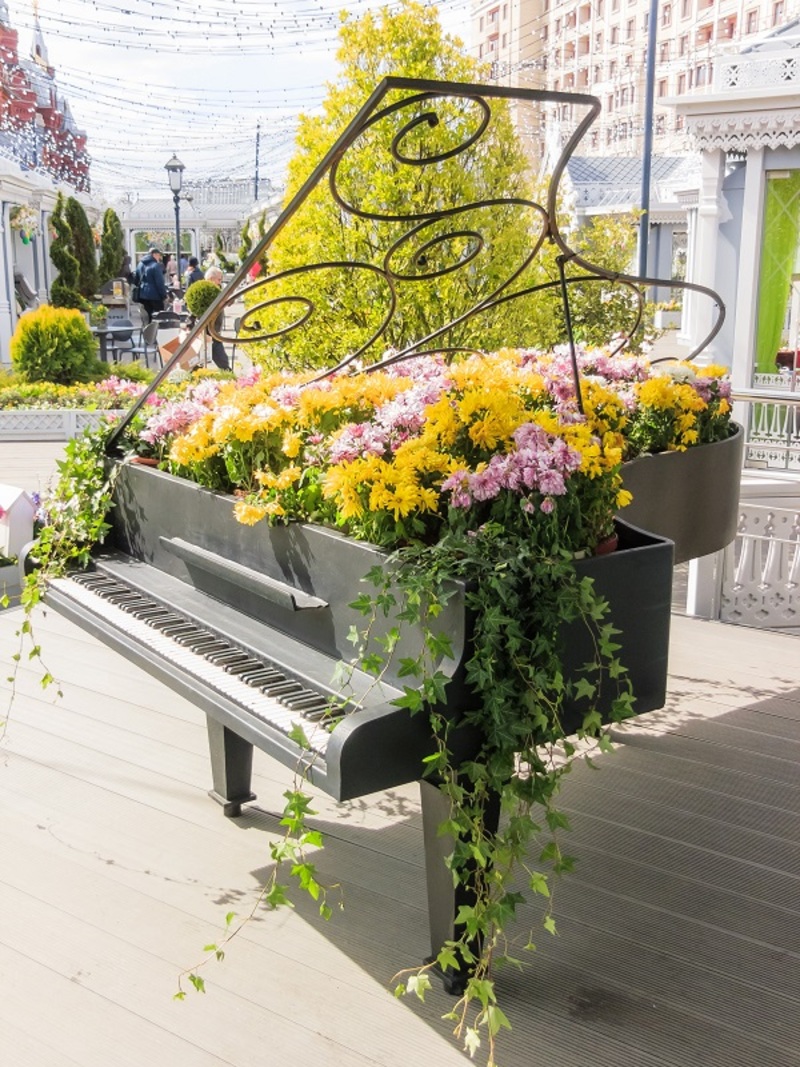The Enchanting World of Peony Flowers and Their Meanings
Posted on 17/08/2025
The Enchanting World of Peony Flowers and Their Meanings
Peony flowers, with their lush blooms and exquisite appeal, have captivated gardeners, artists, and romantics for centuries. Known for their intoxicating fragrance and a spectrum of colors, peonies are not just a feast for the eyes but also carry a tapestry of cultural, historical, and symbolic meanings. Step into the enchanting world of peony flowers and discover their origins, significance, varieties, and tips for growing them in your own garden.

A Brief History of the Peony Flower
The history of the peony flower dates back thousands of years. Originating from Asia, Europe, and North America, these flowers have held a special place in the hearts of many civilizations. The Chinese have cultivated peonies for over 2,000 years, hailing them as the "King of Flowers." In ancient times, peonies were considered symbols of wealth, nobility, and honor. Their prominence is evident in Chinese art, literature, and even festival celebrations.
In Europe, particularly in Greece, peonies were attributed to Paeon, a physician to the gods according to Greek mythology. The Romans, too, adored this blossom and believed it contained magical healing properties. Eventually, peonies made their way to Western gardens in the 18th and 19th centuries, quickly winning the hearts of bounty hunters and botanists alike.
The Symbolic Meanings of Peony Flowers
The significance of the peony flower goes well beyond its breathtaking beauty. Across different cultures and eras, these blooms have symbolized a variety of virtues and stories.
- Romance and Love: The most widespread meaning of peonies is romantic love and affection. They are a popular choice for wedding bouquets and centerpieces due to their association with good fortune, a happy marriage, and enduring relationships.
- Honor and Wealth: Especially in Chinese culture, peonies are seen as emblems of opulence, prosperity, and status. A vase of peonies in the home is thought to bring good luck.
- Bashfulness and Compassion: Some legends link peonies to bashfulness, referencing the shy nymph Paeonia from Greek myths who hid among the petals. The gentle grace of the flower lends itself well to sentiments of modesty and empathy.
- Healing and Protection: In ancient medicine, peonies were believed to ward off evil spirits and treat various ailments, enhancing their symbol as a protective flower.
Cultural Significance in Asia
In China, peonies (?? shao yao and ?? mu dan) are national treasures. They represent royalty and virtue. During the Tang Dynasty, the "peony festival" celebrated their beauty with poetry, song, and painting.
Japan also values peonies, where they're symbols of good fortune, bravery, and honorable friendship. In Japanese tattoos, peonies are paired with lions or dragons to represent a balance between beauty and power.
Western Symbolism and Artistry
In Europe and North America, peonies are often associated with happy unions and the twelfth wedding anniversary. Artists like Renoir and Monet have immortalized peony blooms in their works, emphasizing their status as an inspiration for creativity and passion.
Popular Types of Peony Flowers
The stunning diversity of peony flowers ensures that there is a perfect bloom for every garden and occasion. Here are a few of the most commonly cultivated and beloved varieties:
- Herbaceous Peonies: These perennial peonies die back in the winter and return in spring, showcasing massive, fragrant blooms. Classic cultivars include 'Sarah Bernhardt' with its soft pink double florets, and 'Karl Rosenfield' with vibrant magenta hues.
- Tree Peonies (Paeonia suffruticosa): Unlike herbaceous varieties, tree peonies have woody stems that persist year-round. Native to China, they feature enormous blossoms in shades from yellow to deep purple.
- Intersectional (Itoh) Peonies: These hybrids combine the best of both worlds - the structure of tree peonies and the reliability of herbaceous types. Their robust stems support spectacular flowers in an array of colors.
Each type boasts a spectrum of colors. White peonies signify purity and innocence, pink peonies are linked to love and romance, while red peonies express honor and respect. Less common are the yellow and coral peonies, evoking feelings of warmth and optimism.
Peonies in the Language of Flowers
In the Victorian era, the "language of flowers" or floriography flourished as a secret code of communication. Each flower conveyed a message, and the peony flower's meaning was layered and complex.
- Pink peonies: "Happy marriage", "Happy life", and "Good luck".
- Red peonies: "Honor", "Respect", "Romance", and "Celebration".
- White peonies: "Apology", "Regret", or "Remembrance". They were often included in sympathy arrangements.
This historical association persists today, making peony bouquets and arrangements ideal gifts for marking special milestones or expressing deep emotions when words are not enough.
How to Grow and Care for Peony Flowers
Bringing the magic of peony flowers into your garden is easier than many believe. With a little care and the right location, peonies can thrive for decades - some even outliving their gardeners!
Planting Peonies: Step-by-Step Guide
- Choose the Right Site: Peonies need at least 6-8 hours of direct sunlight and well-drained soil. Avoid locations where water sits after rain.
- Soil Preparation: Amend heavy clay with compost or organic matter to loosen soil. Peonies dislike being waterlogged.
- Planting Depth: For herbaceous peonies, plant the "eyes" (buds on the tuber) just 1-2 inches beneath the soil surface. Planting too deep can prevent flowering.
- Watering and Mulching: Water thoroughly after planting. Mulch in the fall to protect roots, especially in the first year.
- Support and Pruning: Once established, peonies may produce heavy blooms that need staking. After flowering, deadhead spent blooms and cut back stems in autumn.
Pro Tip: Peony plants dislike being moved! Choose your planting spot wisely and avoid disturbing them for several years.
Common Peony Pests and Problems
- Ants on Peonies: A common sight and not a cause for concern. Ants are attracted by the nectar and help the blooms open, but they don't harm the plant.
- Botrytis Blight: Good air circulation prevents this gray mold. Avoid overhead watering and remove affected foliage promptly.
- Poor Blooming: Often due to planting too deep, lack of sunlight, or overcrowding. Peonies need time to establish before blooming vigorously.
Peony Flower Arrangements & Creative Uses
The immense beauty of peony flowers makes them coveted in the floral industry. Their versatility goes beyond gardens:
- Wedding Bouquets: The lush, romantic look of peonies makes them a bridal favorite. Often mixed with roses, hydrangeas, and eucalyptus for showstopping arrangements.
- Home Decor: Fresh or dried peony blooms add elegance to any room, from simple vases to dramatic centerpiece displays.
- Events and Celebrations: Peonies symbolize good luck, making them popular for anniversaries, baby showers, and birthdays.
- Natural Cosmetics: In traditional beauty remedies, peony root extract is celebrated for its calming, anti-inflammatory properties.
Did you know? Peony petals are occasionally used as edible floral decorations in gourmet kitchens, lending both color and a subtle flavor to salads and desserts.
Interesting Facts About Peony Flowers
- Longevity: A well-cared-for peony plant can thrive for over 50 years, and sometimes even surpass a century!
- Record Blooms: Some peonies can grow to have blooms as large as 10 inches across - making them some of the biggest garden flowers.
- Festival Celebrations: The city of Luoyang, China, is famous for its annual Peony Festival each April, drawing millions of visitors to marvel at the vast displays.
- National Emblem: The peony is the official state flower of Indiana, USA, chosen for its resilience and beauty.
- Fragrance: Varieties like 'Festiva Maxima' and 'Duchesse de Nemours' are celebrated for their incredible scent, often used in perfumes.

The Timeless Allure of Peonies
From their ancient origins to their modern-day popularity, peony flowers continue to captivate anyone who encounters them. Their vibrant colors and lush forms symbolize everything from eternal romance to strength, prosperity, and healing. Whether you're seeking the perfect bloom for a special occasion or hoping to add visual splendor to your garden, the magical world of peonies offers infinite inspiration.
So, next time you see a peony in bloom, remember: this isn't just any flower. It's a living symbol of beauty, hope, and history--one that enriches our gardens, our art, and our lives. Embrace the enchanting peony flower in your heart and home, and let its timeless elegance inspire you for years to come.
Conclusion: Discover Your Own Peony Meaning
The enchanting world of peony flowers and their meanings is as rich and layered as the blooms themselves. Whether you are drawn to their visual splendor, intrigued by their cultural symbolism, or inspired to cultivate them in your garden, peonies are a timeless botanical treasure. Explore their varieties, share their symbolism in your life events, and cherish their beauty with every season.
Let the peony be more than just a garden flower--let it be a symbol of joy, prosperity, and heartfelt connection in your life story.
Latest Posts
Unraveling the Mystery: Red Roses and Valentine's Day
Celebrate with the Best Birthday Blooms
Unveil the Sunflower Mysteries You Never Knew
Learn how to make your flowers last longer with these simple techniques






